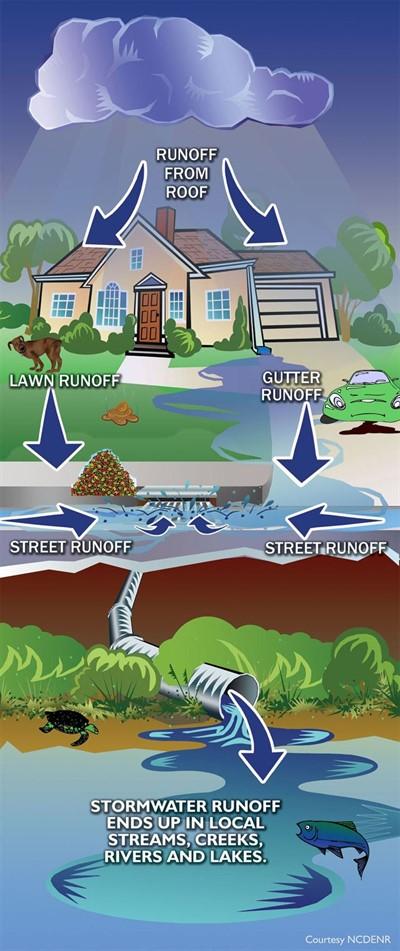
What is stormwater?
Stormwater runoff is generated from rain and snowmelt events that flow over land or impervious surfaces, such as paved streets, parking lots, and building rooftops, and does not soak into the ground (also known as impervious area). The runoff picks up pollutants like trash, chemicals, oils, and dirt/sediment that can harm our rivers, streams, lakes, and coastal waters. To protect these resources, communities, construction companies, industries, and others, use stormwater controls, known as best management practices (BMPs). These BMPs filter out pollutants and/or prevent pollution by controlling it at its source.
The NPDES stormwater program (which Trinity is included in) regulates stormwater discharges from two potential sources: 1) Construction activities and 2) Illicit Discharge. Operators of these sources might be required to obtain an NPDES permit from City of Trinity and North Carolina Department of Environmental Quality (NCDEQ) before they can discharge stormwater. This permitting mechanism is designed to prevent stormwater runoff from washing harmful pollutants into local surface waters.
Construction Activities
Residential and non-residential development that disturbs more than one acre is required to get a stormwater permit from the City of Trinity and an erosion control permit from North Carolina Department of Environmental Quality (NCDEQ). If you believe a property has graded more than one-acre, contact the City of Trinity at 336-431-2841 or NCDEQ Winston-Salem Office at 336-776-9800. If the final construction project goes over 24% impervious surface of the entire property, a post-construction project will be required for this property. To learn more about post-construction projects in Trinity, please click here.
Illicit Discharge
Illicit discharge is any discharge into a storm drain system that is not composed entirely of stormwater. Please go to the illicit discharge page if you wish to learn more about illicit discharge or report an illicit discharge to the City of Trinity.
